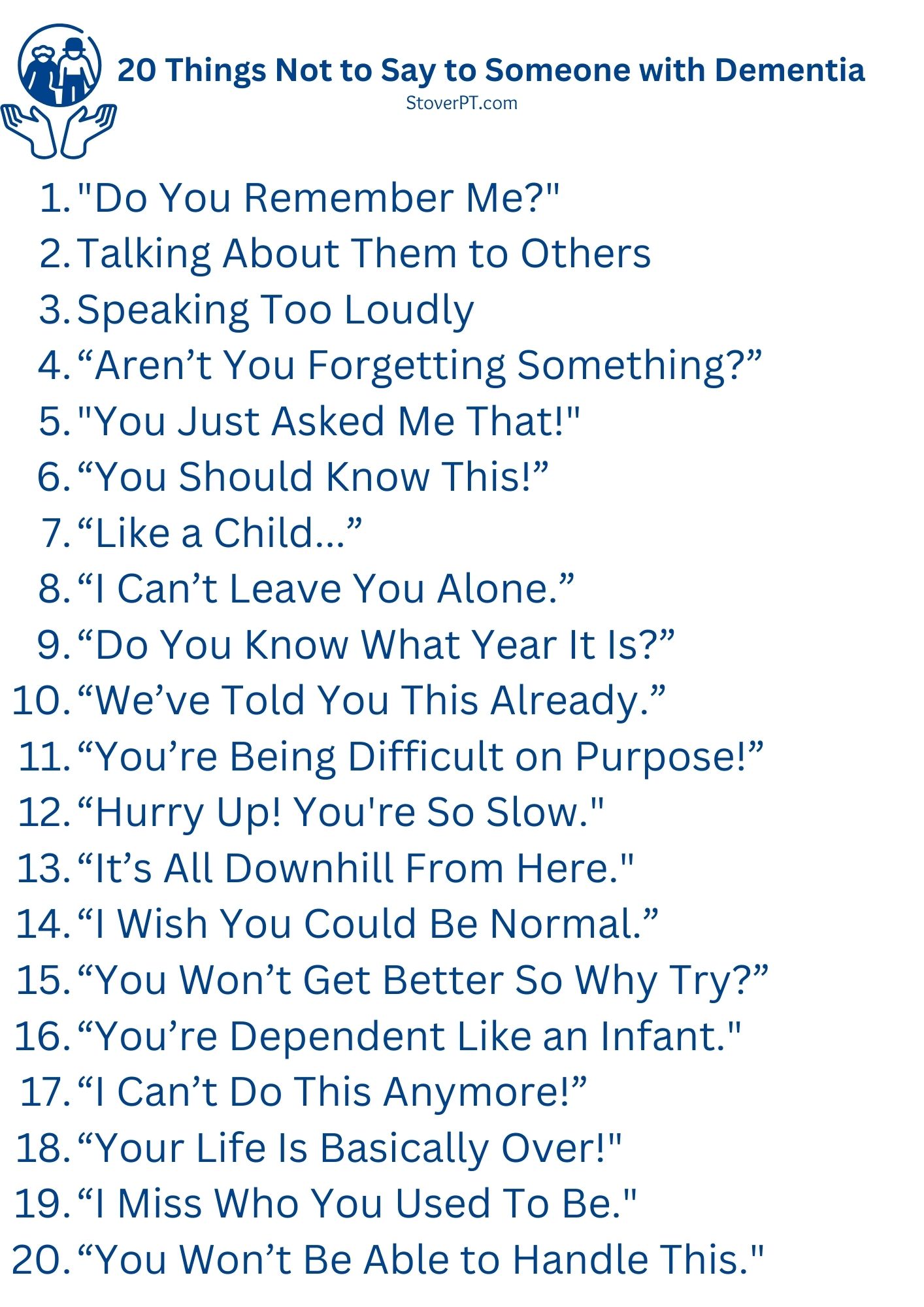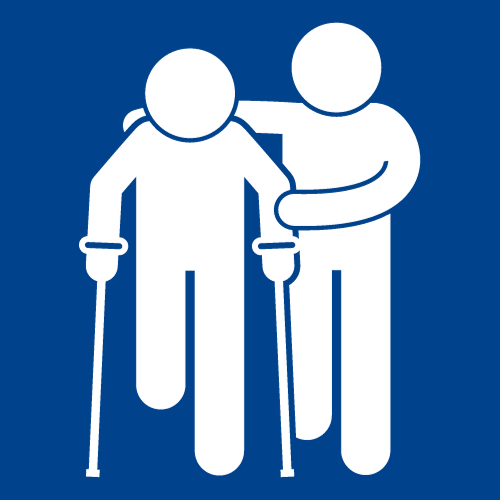Dementia is a challenging condition, both for the person living with it and their loved ones. Communication can become difficult as the disease progresses. Well-meaning friends and family sometimes make comments to a person with dementia that are insensitive, frustrating, or infantilizing.
As a physical therapist who works extensively with dementia patients, I’ve witnessed how remarks can negatively impact mood and dignity. This article provides tips on phrases to avoid and better ways to interact.
I have also provided these words in a shareable JPG file that you can download or print. It is attached at the end of this guide.
Why Words Matter?
A dementia diagnosis impacts memory, reasoning, and speech center functions in the brain. While cognitive abilities change, the person’s adult self-identity and emotional world remain. Thoughtless comments that talk down to them or ignore their struggles can hurt. Statements meant to be helpful sometimes come across as belittling. Condescending language contributes to social isolation for the 6.7 million U.S. Alzheimer’s patients. Monitoring our interactions prevents further stress.

1. “Do You Remember Me?”
Constant testing with questions like “do you remember me?” emphasizes what someone can’t do. The inquiry often embarrasses or frustrates them. Better strategies introduce yourself each visit, regardless of their recall abilities that day.
2. Talking About Them to Others
Having private conversations about the person diagnosed with dementia while in their presence, shows poor judgment. Even if the individual is thought to have lost track of the dialogue, he or she sometimes retains more comprehension than realized. It’s always best to maintain communication directly with the patient.
3. Speaking Too Loudly
The dementia disease results in gradual hearing loss for some patients. But others retain regular auditory sensitivities longer. Shouting when conversing can feel abrasive and daunting. If auditory impairment exists, gently guide wearable sound-amplification headphones for that individual. Check often to see if your vocal volume suits their needs.
4. “Aren’t You Forgetting Something?”
Frequent memory lapses already leave dementia patients feeling embarrassed and vulnerable. Asking “aren’t you forgetting something” when they miss an item or task requires them to admit, yet again, the failures they are powerless to prevent. Have patience and come up with a tactful way to remedy errors without calling deliberate attention to declining recall skills.
5. “You Just Asked Me That!”
In most dementia cases, short-term memory worsens first. Repeating the same question is rarely intentional. Responding with irritation or condescension amplifies their humiliation over something they cannot control. Gently answering each inquiry avoids accentuating the disability. It shows compassion for the recognized complications they battle.
6. “You Should Know This!”
As new limitations unsettle daily functioning, reprimanding comments like “you should know this!” salt already open wounds. Dementia patients often mourn the increasing mental skills slipping away. Harsh rebukes for what should still be retrievable information add to their loss and self-reproach. Signal with awareness that you recognize their reality. Offer thoughtful support.
7. “Like a Child…”
Declaring that someone appears “like a child” or is “childish” imposes unjustified stereotypes. Dementia mainly influences regions of the brain dealing with cognition, not maturity or dignified traits formed through their long adult history. Make no assumptions about inner growth regressing backwards. Give space for their earned wisdom to continue shining through.
8. “I Can’t Leave You Alone.”
Insisting “I can’t leave you alone” conveys lack of trust in their basic functioning. But many dementia patients still eat, use familiar bathrooms, and complete well-ingrained activities without assistance. Wanting oversight reflects more about surrounding discomfort than actual capabilities Lost independence wounds deeply. Evaluate skill levels first before deciding constant supervision necessary.
9. “Do You Know What Year It Is?”
Putting someone instantly on the spot with questions like “do you know what year it is?” often humiliates more than helps. Discovering mental declines through respectful dialogue and assessment prevents embarrassment. If disorientation concerns seem likely, have physicians verify causes and intervention needs before non-professionals probe capacities.
10. “We’ve Told You This Already.”
Reacting to repetitive comments from dementia patients with “we already told you this!” frustrates all involved. Restate information or reminders as many times as needed. Understanding brain changes account for overlapping inquiries, without shaming people for what they cannot regulate, creates a safe space for positive interactions.
11. “You’re Being Difficult on Purpose!”
Asserting “you’re just being difficult on purpose” weighs relationships down with false accusations. Dementia blocks intentional thought-processes and fuels compulsions seemingly beyond conscious reach. Separate the disease from the person when behaviors baffle or challenge you. Seek education on navigating tangled communication and neurobiology for realistic expectations.
12. “Hurry Up! You’re So Slow.”
Telling those losing functioning to “hurry up, you’re so slow!” fails to see reality. Dementia scatters attention, disrupts multi-tasking, and slows motor responses. Systems in the brain handling speeds fundamentally falter. Have patience with pacing or task switches that once operated automatically. Understanding disease effects fosters supportive ties, despite changes.
13. “It’s All Downhill From Here.”
Resist proclaiming “it’s all downhill from here!” Cognitive impairment does progress at varying unpredictablerates. But hope always remains for stabilizing mood, retaining personal connections, and relishing life’s joys where possible. Take symptoms in stride, emphasize empathy and avoid feeling sorry for yourself or them. Address challenges, utilize strengths, and treasure each lucid moment.
14. “I Wish You Could Be Normal.”
Sharing thoughts like “I wish you could just be normal” implies you liked their past self better. But expressing longings for previous functional levels disregards their most authentic identity – the one needing support now. Meet them where they currently are. Help them feel heard and valued at all points along the dementia journey, not just before diagnosis.
15. “You Won’t Get Better So Why Try?”
Though advanced dementia won’t improve with time, pathways exist for maintaining daily victories. Assuming treatment is hopeless often limits willingness to pursue speech therapy, behavioral interventions, or cognitive exercises. Suggesting they are beyond repair by saying “why even try, you won’t get better” discounts professional input and their courageous efforts.
16. “You’re Dependent Like an Infant.”
Declaring someone has grown “totally dependent like an infant” leaves a mark. Their personhood stays intact, even when dementia gradually requires hands-on care with certain functions. Assign capable caregivers without stripping away their right to dignity or insinuating anything now less fully human about them. Support strengths persisting rather than only fixating on losses.
17. “I Can’t Do This Anymore!”
It’s true that managing dementia patients stretches us mentally and emotionally. But voicing frustrations by exclaiming “I can’t do this anymore!” in their presence, comes across as our needs mattering most. Validate how taxing this feels, just not directly to them. Pursue respite support to preserve the relationship and your own resilience. You both deserve consideration, not blame or despair.
18. “Your Life Is Basically Over!”
In early dementia stages particularly, individuals continue pursuing creative outlets, family connections and purpose. The future may look different than envisioned, but proclaiming “your life is basically over” robs hope. Help the diagnosed person map out fulfilling modified activities for coming years. Focus on realistic goals and sticking together through the transitions.
19. “I Miss Who You Used To Be.”
Dementia necessitates grief and adaptation for everyone close to those struggling with difficult changes. Though we might deeply miss previous relationship dynamics or their past vibrancy before dementia drained zest, refrain from saying “I miss who you used to be.” Comments about preferring their prior self dismisses their equal deservingness of regard now. Concentrate on discovering new ways to relate with compassion.
20. “You Won’t Be Able to Handle This.”
As independent functioning wanes, pulling someone prematurely from cherished activities because “you won’t be able to handle this” risks lowering self-worth if disengagement isn’t yet warranted. Monitor their capabilities before deciding they cannot manage well enough anymore. Maximizing life participation improves mood and purpose when facing dementia-related losses.

Moving Forward with Empathy
Open communication and genuine sensitivity surrounding dementia save the hurtful impacts when word choices go awry. See the diagnosis through the lenses of empathy and non-judgment. From my professional experience, families avoiding these 20 ineffective remarks preserve intimacy and support coping so much better. Meet them where they’re at along the journey in ways that uplift and dignify.






